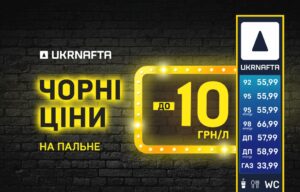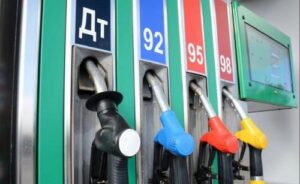
According to data from the A-95 consulting group, retail prices for diesel fuel rose from 58.3 to 59.9 hryvnia per liter, or by 1.6 hryvnia per liter, between January 5 and January 30. while prices for A-95 gasoline rose from 58.2 to 60.3 hryvnia per liter, or by 2.1 hryvnia per liter.
According to A-95 director Sergey Kuyun, the reason for the rise in fuel prices in January is the global increase in oil prices.
“Today is January 30. Since the beginning of the month, the price of oil has risen from $60.7 to $70.7 (+16.5%). Global diesel fuel prices for the same period rose from $614 to $714/t (+16.2%),” he wrote on his Facebook page at the end of last week.
The expert also noted that wholesale prices for automotive diesel fuel in Ukraine rose from 48.52 to 52.46 UAH/liter, or by 4 UAH/liter (+4%), over the same period.
“In other words, we see that global prices rise first, followed by wholesale prices, and only then retail prices,” he said.
At the same time, according to A-95, prices for autogas rose by only 0.7 UAH/liter between January 5 and 30, from 37.6 to 38.3 UAH/liter.

Ukrnafta JSC announces a commercial procurement for the provision of road transport services for light petroleum products to supply its network of filling stations.
Due to the expansion of its network and increased sales of petroleum products, the company invites qualified suppliers of oil and gas products to submit commercial proposals.
The procurement will take place on the platform https://zakupivli.pro/ in two stages; proposals submitted by other means will not be considered.
For more detailed information on participation in commercial procurement and the selection process, please contact us by email: Dmytro.Sles@Ukrnafta.com or follow this link.
Commercial proposals will be accepted until January 27, 2026, inclusive.
We are looking forward to working with reliable partners!
JSC Ukrnafta is Ukraine’s largest oil production company and the operator of the largest national network of gas stations, UKRNAFTA. In 2024, the company entered into asset management with Glusco. In 2025, it completed an agreement with Shell Overseas Investments BV to purchase the Shell network in Ukraine. In total, it operates 663 gas stations.
The company is implementing a comprehensive program to restore operations and update the format of its network of gas stations. Since February 2023, it has been issuing its own fuel vouchers and NAFTAKarta cards, which are sold to legal entities and individuals through Ukrnafta-Postach LLC.
The largest shareholder of Ukrnafta is Naftogaz of Ukraine with a 50%+1 share.
In November 2022, the Supreme Commander-in-Chief of the Armed Forces of Ukraine decided to transfer the company’s corporate rights, which belonged to private owners, to the state, and they are now managed by the Ministry of Defense.

The rise in global oil prices, coupled with the depreciation of the hryvnia against the euro and the dollar, could lead to higher fuel prices in the retail market as early as January, said Sergey Kuyun, director of the consulting company A-95.
“The exchange rate has added one hryvnia, and global prices have added one and a half. The market is holding steady for now, but I think that if nothing changes, there will be some correction, or more precisely, a price increase as early as January,” he said during a briefing at the Media Center of Ukraine in Kyiv on Thursday.
According to the expert, the price of gasoline on the wholesale market has already risen by 2 hryvnia per liter, and the price of diesel fuel, in particular its Arctic brand, which has seen a sharp increase in demand with the onset of frost, is showing similar growth dynamics.
As reported, the increase in excise taxes on fuel from January 1, 2026, did not lead to an increase in prices at gas stations at the beginning of the year, as the decrease in the purchase cost of fuel in December due to the decline in world oil prices offset the tax increase.
In Ukraine, the third stage of the planned increase in excise taxes on motor fuel took place on January 1, 2026, in particular, on gasoline – by UAH 1.75/liter, on diesel fuel – by UAH 2.25/liter, and on autogas – by UAH 1.5/liter.
Prior to this, on September 1, 2024, and January 1, 2025, there was a two-stage increase in excise taxes on fuel, as a result of which the tax on autogas increased by 6.4 UAH/liter, on gasoline by 3 UAH/liter, and on diesel fuel by 4 UAH/liter.

According to the Serbian Economist, Serbia has not received a special license from the U.S. OFAC to continue the work of the company NIS, which has fallen under U.S. sanctions. This was announced by Serbian President Aleksandar Vucic. He also said that Serbia has decided to completely shut down the Pančevo refinery.
Since November 25, the NIS refinery has been operating in a reduced circulation mode due to a shortage of oil. Vucic noted that NIS will decide when to complete the shutdown of the refinery.
Earlier it was reported that the Serbian parliament is preparing an amendment that would allow Serbia to become the owner of NIS. A possible sale of 56.15% of NIS shares to Hungarian partners is also being considered.
NIS, a subsidiary of Gazprom Neft, was included in the US SDN List in 2025.
https://t.me/relocationrs/1865

On Thursday and Friday, November 27 and 28, 2025, all customers can refuel their cars at the gas stations of Ukraine’s largest network, UKRNAFTA, at the most favorable price.
Base prices for these two days have already been reduced:
• A92 — 55.99 UAH/l;
• A95 — 55.99 UAH/l;
• A95 Energy — 55.99 UAH/l;
• A98 Energy — 66.99 UAH/l;
• DP — 57.99 UAH/l;
• DP Energy — 58.99 UAH/l;
• LPG — 33.99 UAH/l.
When purchasing fuel through the UKRNAFTA app wallet, the following additional discounts apply:
• −2.5 UAH/l when purchasing gasoline and diesel fuel;
• −0.5 UAH/l on LPG.
You can also refuel with gasoline and get -10 UAH/l:
• −2 UAH/l — when using the UKRNAFTA app;
• −1 UAH/l — when refueling 20 l or more and purchasing winter washer fluid;
• −1 UAH/l — when refueling 20 l or more and purchasing a hot dog;
• −2 UAH/l — when refueling 40 l or more (25–40 l: −1 UAH/l)
• −2 UAH/l — when paying with a Mastercard from OTP Bank;
• −2 UAH/l — additional bonuses from partners: Nova Poshta, YasnoLove, Vodafone.
That is, if a UKRNAFTA customer fills up with 40 liters of gasoline, enjoys a hot dog, purchases a high-quality winter windshield washer fluid, collects a partner bonus, scans the app, and pays with a Mastercard from OTP Bank, they will receive a discount of 10 UAH/liter.
We invite everyone to UKRNAFTA — the most affordable gas station chain near you!
JSC Ukrnafta is Ukraine’s largest oil production company and the operator of the largest national gas station chain, UKRNAFTA. In 2024, the company entered into asset management with Glusco. In 2025, it completed an agreement with Shell Overseas Investments BV to purchase the Shell network in Ukraine. In total, it operates 662 gas stations.
The company is implementing a comprehensive program to restore operations and update the format of its network of gas stations. Since February 2023, it has been issuing its own fuel vouchers and NAFTAKarta cards, which are sold to legal entities and individuals through Ukrnafta-Postach LLC.
The largest shareholder of Ukrnafta is Naftogaz of Ukraine with a 50%+1 share.
In November 2022, the Supreme Commander-in-Chief of the Armed Forces of Ukraine decided to transfer to the state the corporate rights of the company that belonged to private owners, which is now managed by the Ministry of Defense.

PJSC Ukrnafta imports gasoline and diesel fuel according to Euro-5 standards from Sweden, Poland, Lithuania, Greece, and Kuwait, the company’s press service reports.
In particular, it is diesel fuel and gasoline produced by Preem (Sweden), Orlen (Poland), Kuwait National Petroleum Company (Kuwait), Hellenic Petroleum and Motor Oil Hellas (both Greece).
“Ukrnafta is Ukraine’s largest oil producer and operator of a national network of filling stations. In March 2024, the company took over the management of Glusco assets and operates 545 filling stations – 460 owned and 85 managed.
The company is implementing a comprehensive program to restore operations and update the format of its filling stations. Since February 2023, Ukrnafta has been issuing its own fuel coupons and NAFTA cards, which are sold to legal entities and individuals through Ukrnafta-Postach LLC.
Ukrnafta’s largest shareholder is Naftogaz of Ukraine with a 50%+1 share. In November 2022, the Supreme Commander-in-Chief of the Armed Forces of Ukraine decided to transfer to the state a share of corporate rights of the company, which belonged to private owners and is currently managed by the Ministry of Defense.